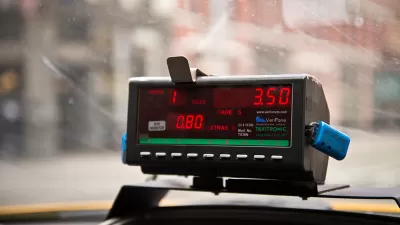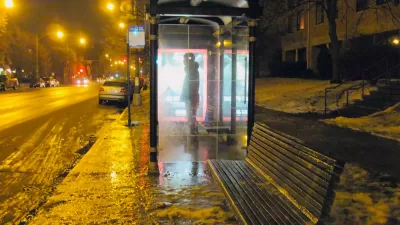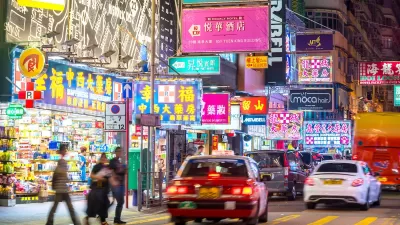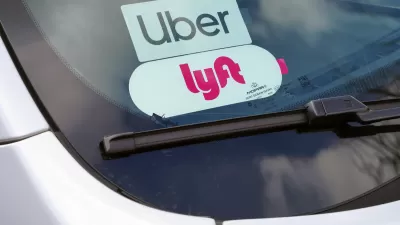An op-ed counters concerns about the social equity consequences of Uber by allowing the possibility of public benefits arising from transportation network companies.

Is Uber the devil? I'll admit that I'm an occasional user of Uber, or what I call network-based transportation (e.g., transport than is facilitated by a location-based technological algorithm that optimizes trip matching). There are many reasons why I enjoy and perhaps don't tend to demonize Uber, one of which is related to the convenience of the service. That said, until the recent decision by Los Angeles to allow transportation network companies, like Uber, to pick up passengers at the Los Angeles International Airport (LAX), many critics have pointed out the potential negatives of the technology. Most of the criticisms focus on problems of social equity, but I believe it is time for a counterpoint.
One of the loudest voices in the dialogue has been taxi unions and other institutions, which for many years controlled the market in terms of ride pricing and entry into the taxi industry for potential drivers. They have raised an outcry in New York, Paris, and elsewhere. Such outcry includes a recent stunt in Las Vegas, where taxi drivers stopped working on the Strip to protest.
Taxi drivers argue that their services are not as exclusive as Uber and that they offer greater quality of service and better compensation for employees. But while this gatekeeper function might provide some level of quality control, my recent experience leads me to believe that the disadvantages of transportation network companies are not outweighed by the advantages. Rather, as industry disruptors, companies like Uber and Lyft present more opportunities and they do barriers in society.
Take, for example, an Uber ride I took while on a business trip in Washington, D.C, with a driver that was a first generation Latino. He only had good things to say about his job with Uber. A Guatemalan immigrant, he lost his job in construction during the downturn. He had been working at Home Depot when he had the opportunity to begin driving for Uber, so he jumped on it. He claimed to set his own hours and make a decent wage, while working in an industry that he felt benefited other people.
During my ride, he spent a good deal of time expressing how he was making a difference by keeping drunk drivers off the road. He also expressed how he would not normally have had this opportunity because of the expense and time it would take to get a taxi medallion. In his opinion, if consumers were willing to choose to ride with "rookies" like him or others like him, then the competition was "doing something wrong." Furthermore when he dropped me off he said he was going to sign off and go watch his grandson play soccer. He explained that this was a luxury he never would've had with any of his other jobs.
Upon further investigation, the experience described was not an anomaly. The data about who Uber serves reveals a reasonably fair playing field for individuals who want to become drivers. Based on an independent report commissioned by Uber and conducted by Princeton economist Alan Krueger, drivers are more diverse than taxi unions—with more minorities and women—and make more than minimum wage. They are diverse, many times female, and may want flexible schedules, as my driver indicated. (Note: the full study is also available online as a pdf.)
Granted that my experience riding with a middle-aged man in Washington, D.C. may be an anomaly, but there is a possibility that he was speaking to a larger truth. What if Uber and other forms of networked transportation are not such a bad thing? What if the disruption of an important industry through technological innovation results in better service to consumers? There is a possibility that Los Angeles is right. Networked transportation tools may be an opportunity for those who have traditionally been marginalized to enter into an industry that has been highly exclusive up to this point. Could it be that technologies like Uber break down the barriers of traditional institutions medallions that are obstacles to social equity?
The truth is likely to be determined sometimes in the future, but I aim to find out as much as I can now. Two months ago, I became an Uber driver. I signed up, got my car inspected, had a background check, and began driving. Up to this point, I cannot I agree with the taxi unions' arguments against transportation network companies. I found the check on my vehicle and background to be thorough, and the institutional safeguards of the service to be comprehensive (although since I signed up to drive with Uber, I cannot speak to other networked technology services). Driving was easy, and I have made a fair amount of money when I have chosen to commit to driving. (Note: As a researcher I have chosen to donate the money I make to the local bicycle coalition to avoid potential bias.) I can see how this presents an opportunity for both full and part-time drivers, and how it is, on the whole, good for consumers. Will I continue? Perhaps—but more so I feel that I have directly explored how networked technology may be the future of transportation.
The city of Los Angeles' recent legislation could be visionary: Increased completion in the taxi-industry might be good for consumers and also for drivers otherwise unable to enter the industry. Fares may be lower, so they are more accessible to individuals regardless of ethnicity or income. More importantly, networked transportation technology may optimize trips, ideally reducing vehicle miles traveled using networked transportation. The potential to reduce trips is exemplified by Uber's ride-matching service, UberPool, currently piloted in some markets. UberPool offers obvious climate benefits by limiting solo drivers and reducing total transportation emissions.
Obviously there are still questions—one of the most frequent of which I hear: "Do networked based technologies like Uber poach transit riders?" To me, the answer is an obvious "no," but that is likely a product of having ridden and participated in the technology for so long. For those who have questions, I would pose a challenge: try it. Use a networked-based technology and consider its implications. How might transportation network companies offer a transportation demand management (TDM) or vehicular miles traveled (VMT) reduction strategy? How might they play into the not-to-distant future of autonomous vehicles (AVs)? As this technology begins to converge with others, such as AVs, we may see a new transportation paradigm begin to materialize that harnesses individual vehicles as forms of transit. Clearly, Wall Street has taken notice.
The future will tell, but for now I say—kudos Los Angeles. Thank you for taking a risk. Thank you for exploring network-based transportation and not demonizing it. Now let's see where it takes us. As a rider and consumer, I appreciate it. As a planner, we will see. On the whole, I am optimistic.
William (Billy) Riggs, PhD is an Assistant Professor of City & Regional Planning and a leader in the area of transportation planning and technology, having worked as a practicing planner and published widely in the area. He has over 50 publications and has had his work featured nationally by Dr. Richard Florida in The Atlantic. He is also the principal author of Planetizen's Planning Web Technology Benchmarking Project. He can be found on Twitter @williamwriggs.

Study: Maui’s Plan to Convert Vacation Rentals to Long-Term Housing Could Cause Nearly $1 Billion Economic Loss
The plan would reduce visitor accommodation by 25,% resulting in 1,900 jobs lost.

North Texas Transit Leaders Tout Benefits of TOD for Growing Region
At a summit focused on transit-oriented development, policymakers discussed how North Texas’ expanded light rail system can serve as a tool for economic growth.

Using Old Oil and Gas Wells for Green Energy Storage
Penn State researchers have found that repurposing abandoned oil and gas wells for geothermal-assisted compressed-air energy storage can boost efficiency, reduce environmental risks, and support clean energy and job transitions.

Private Donations Propel Early Restoration of Palisades Playground
Los Angeles has secured over $1.3 million in private funding to restore the Pacific Palisades playground months ahead of schedule, creating a modern, accessible space that supports community healing after recent wildfires.

From Blight to Benefit: Early Results From California’s Equitable Cleanup Program
The Equitable Community Revitalization Grant (ECRG) program is reshaping brownfield redevelopment by prioritizing projects in low-income and environmental justice communities, emphasizing equity, transparency, and community benefits.

Planting Relief: Tackling Las Vegas Heat One Tree at a Time
Nevada Plants, a Las Vegas-based nonprofit, is combating the city’s extreme urban heat by giving away trees to residents in underserved neighborhoods, promoting shade, sustainability, and community health.
Urban Design for Planners 1: Software Tools
This six-course series explores essential urban design concepts using open source software and equips planners with the tools they need to participate fully in the urban design process.
Planning for Universal Design
Learn the tools for implementing Universal Design in planning regulations.
Ascent Environmental
Borough of Carlisle
Institute for Housing and Urban Development Studies (IHS)
City of Grandview
Harvard GSD Executive Education
Toledo-Lucas County Plan Commissions
Salt Lake City
NYU Wagner Graduate School of Public Service





























